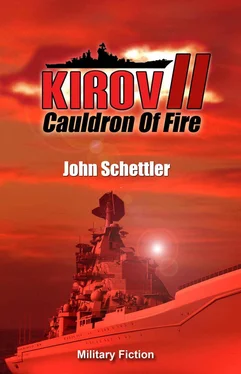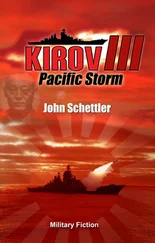“Comments on this course?” asked Volsky, his bushy brows rising as he looked to the others, particularly Karpov, who spoke next.
“Heading for the Black Sea is a definite possibility,” said Karpov. If we made it through the Bosporus then we might join in the fighting around Novorossiysk. For that matter, we might even be able to smash the German Sixth Army with our remaining nuclear weapons and prevent the misery and death of Stalingrad. That option could reverse the course of the war in the east much sooner. If we have to fight again, why not fight directly for Russia this time?”
Volsky frowned at the mention of nuclear weapons, the image of the massive explosion at sea all too fresh in his mind.
“Stalin would certainly appreciate that,” said Volsky. “I had some time to consider such a course when we first began this misadventure. We also have information about the course of events that will be more valuable than the weapons we could use. We know the timing of every German offensive and its objective, correct Mr. Fedorov?”
“True, sir, but that is 1800 sea miles to the Black Sea, and through the Strait of Messina, past Crete and all the Axis bases in Greece, then into the Dardanelles for a 200 mile cruise in those restricted waters, through minefields, past shore batteries and also within range of German air power. And once we do fight through we’ll still be bottled up in the Black Sea for the duration of the war, assuming we do not suddenly vanish again. Then what? How long before our own countrymen begin to insist on a little more than information from us? I have not forgotten what we all said about Stalin the first time we visited this question.”
Volsky nodded, a grim expression on his face.
Fedorov continued. “Here is another alternative. I think we could get up north into the Ligurian Sea easily enough, or into the Northern Med south of Toulon. We could hover off the coast there and wait out the operation. Let the two adversaries slug it out as they did historically and interfere as little as possible. If we sail anywhere near the action now then we will eventually be discovered and engaged by one group of forces or another. Yes, we can probably prevail in these actions, but eventually word will get out and the concentration of Axis forces will begin to mass against us—or British. We could even be attacked by both sides at once in the confusion. We can’t go west in the short run,” he reasoned, “and if we go south east through the Strait of Messina we are committed to a long voyage through the Aegean, with enemy airfields on every side and then internment in the Black Sea.”
“Then it looks like our only option is north away from the major fighting while we consider this question further,” said Volsky.
“A good possibility,” said Fedorov. “But it would mean we would have to run past these Italian cruiser patrols, and then surge north through the Tyrrhenian Sea again and either run north of Corsica, past the major Italian base at La Spezia and a lot of enemy aircraft, or else we must risk the narrows of the Bonifacio Strait and the Italian naval facility at La Maddalena there.”
“And then what,” said Volsky. “Suppose we do this and fight our way west of Sardinia and Corsica by one route or another. Suppose we work our way north of the Balearics, then what? We will be ready to run the final bottle-neck to Gibraltar, yes? And what will we find there?”
“The British,” said Fedorov flatly. “Everything they have left after the battle will withdraw in that direction, and the heavy units will be there well before us, unless we move quickly. Battleships Nelson and Rodney for a start, and a swarm of destroyers and cruisers. Their carriers get beat up pretty badly if the action follows the history. They have already lost Eagle , and later on Indomitible will also be hit and damaged to a point where she can no longer operate effectively. Argus is of no concern, but they will still have our old friends Victorious and Furious , and all the air power they have left flying out of Gibraltar, another unsinkable aircraft carrier like Malta.”
“Could we punch our way through, Karpov?” The Admiral wanted to bring the Captain into the discussion.
“Of course,” Karpov said immediately. “You saw what we did when the full power of this ship was focused as it can be in dire need. I do not wish to say that the course I took was the wisest….” He paused, and Volsky could see that this was difficult for him. “…or even that my choice of tactics was correct in that regard. I was obsessed at the time with the possibility of striking a decisive political blow—one that would truly alter the course of events and leave the world a better place for the Russia we left back home, the country we all swore to protect and defend.”
“True, but we have seen the result, Captain, and it was not pleasant. We found hell out there, or as close to it as any man can come while alive on this earth. We may all get there again on our own when we pass on,” he smiled. “But I have little desire to go there again now.”
“But that is what we must do if you sail west or east,” said Karpov. “We must pass through the gates of hell—be it Messina, Bonifacio, the Bosporus or Gibraltar. The western course is also some 1800 miles of dangerous sailing, and a major battle at the end.”
“Yet one you feel we can win?”
“Certainly, though much will depend on the status of our missile inventories when we reach that place. I know I invite your rebuke with this next remark, but I must tell you that where this ship sails, there are no unsinkable aircraft carriers.” He put his fingertip flatly on the desk to emphasize his point. “We have the means to obliterate either Malta or Gibraltar if it comes to that, and wipe their air power off the map in one blow. And if there is still any stomach for the ideas we discussed before this whole thing began, then I must also say that by destroying either of these bases we would decisively effect the outcome of this war, particularly now, at this moment, August of 1942. The loss of either base would seriously tip the balance in favor of Rommel in North Africa. He may not prevail in the end, but there would be a strong chance that he pushes into Alexandria, or even to the Suez Canal itself. It could effectively knock Britain out of the land war, at least for a time.”
Fedorov noted how each course eventually led to the deployment of nuclear weapons to make a decisive blow and alter the course of the war, at least in Karpov’s mind. He was cautious about getting into a shooting match here with the Captain, but was not surprised to hear this hard line from him. He glanced at Volsky before he spoke, waiting to see if the Admiral had any remarks, then offered another point.
“What about Operation Torch. The Americans are about to enter the war in those landings, scheduled for November 8th. If Rommel manages to push the British back to Suez, he will still find the American Army behind him in due course. All things considered, the loss of Malta may make a considerable difference—and certainly Gibraltar, but I believe the Allies would still persist with the plan for an invasion at Casablanca, Oran and Algeria, and then drive east.”
“We can guess and conjecture this all day,” said Karpov. “I do not say you are wrong, Fedorov, but without Malta or Gibraltar, the Axis forces will easily supply Rommel with anything he needs, while their own supply lines to Egypt will stretch thousands of U-boat infested sea miles around the Cape of Good Hope. Suppose Rommel were to defeat the Americans as well?”
“A possibility, Captain.”
“Yet how will we know?” The Admiral put his finger on the real problem. “That is our dilemma when we talk about decisive interventions. We can never really know what turn the history will take, and it may darken in ways we have already seen.”
Читать дальше












